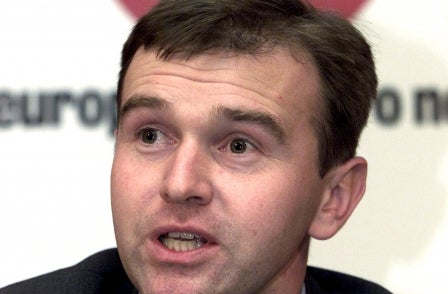
-
Politicians subjected to interviews designed to make them look 'evasive'
-
Broadcasters 'come up with anodyne reports that do not help the public'
-
'Tendency to have hostile interviews', says former press secretary
-
Calls to overhaul party political broadcasts
A former press secretary to David Cameron has launched an attack on the media as he called for a shake-up of the rules governing party political broadcasts.
Tory George Eustice, who was an aide to Cameron when he was leader of the opposition, claimed politicians were not given credit for "saying what they believe" and were subjected to interviews designed to make them look "evasive and on the back foot".
He called for greater flexibility for party political broadcasts so politicians could put their case directly to the public.
Eustice told MPs in Westminster Hall the UK probably had "the most draconian laws and restrictions on political advertising in the democratic world" and could be in breach of the European Convention on Human Rights .
With the influence of newspapers in decline, Eustice said broadcast media was becoming more important but restrictions enforcing impartiality affected TV and radio journalism.
"They are required to balance both sides, so they often come up with anodyne reports that do not help the public to reach an opinion," he said.
"There is always an emphasis on the two-way with the political correspondent, so a party leader who has just given a speech may be given 12 to 18 seconds to explain what they are trying to do, so that there will be plenty of time for a one-minute or two-minute two-way with the correspondent when they try to put a gloss on what the party leader is supposedly saying.
"That has led to over-emphasis on process and political strategy instead of giving politicians credit for doing what they do most of the time – saying what they believe."
Eustice said he "lost count of the number of times" Cameron had given a speech only for it to be "interpreted through the prism of political strategy, which undermines public trust in the political process, unnecessarily in my view".
The Camborne and Redruth MP added: "A further problem with too-powerful broadcasting media is a tendency to have hostile interviews with a duel between the interviewer and the politician, because the programme's objective is to make the politician look evasive and on the back foot."
The larger political parties are usually given three party election broadcasts during an election period, each lasting up to 4 minutes 40 seconds.
Eustice proposed a system allocating each party 12 minutes to use how they wished, allowing up to a dozen 60-second party political bulletins.
"That would introduce flexibility, and the advantage is that public engagement and the chances that the public would see those broadcasts would be increased," he said.
"It would also increase the chances of people staying tuned in long enough for them to receive the message."
Culture minister Ed Vaizey said party political broadcasts "provides the opportunity for the main political parties to share their policies, explain their views and engage fully with the electorate – without the gloss of a BBC political editor overlaid on top" as Mr Eustice hinted.
He said Eustice had some "interesting proposals" which he should submit to Ofcom's consultation on the broadcasts.
Email pged@pressgazette.co.uk to point out mistakes, provide story tips or send in a letter for publication on our "Letters Page" blog
